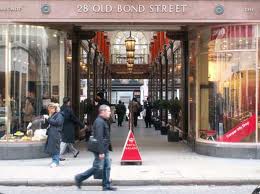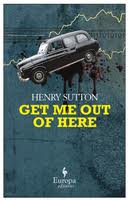Henry Sutton’s sixth novel, Get Me Out of Here, begins with Matt Freeman returning to an optician’s shop in London. Apparently, he has intentionally broken the frames acquired earlier from the shop. About the new frames he is contemplating, he says, “I was certain that I could break them. Indeed I knew that I would break them, if I was not suddenly overcome with a newfound passion for them.” He talks to us about the role glasses play in his life and his stringent requirements for quality in all of his furnishings and accessories. The first pages of his monologue express disgusts recognizable to most readers (and undoubtedly shared by many). Freeman steps out from the shop to a mall concourse:
 “How I hated that concourse. It wasn’t just the luminous artificial light, the cheap marble flooring, the ubiquitous second-rate stores, the overweight office workers shuffling from outlet to outlet while stuffing their faces with foulsmelling Wotsits – why did everyone have to snack all the time, mostly the obese? No, it certainly wasn’t just the density of the crowd, nor the unimaginative décor. It was the stink of hollow money. There was nothing remotely discreet. Or particularly real. This, all this, amid global recession. Give me muted Marylebone, any day. Or Mayfair. I could take wealth, even extreme wealth, if it had a bit of class, and beauty.”
“How I hated that concourse. It wasn’t just the luminous artificial light, the cheap marble flooring, the ubiquitous second-rate stores, the overweight office workers shuffling from outlet to outlet while stuffing their faces with foulsmelling Wotsits – why did everyone have to snack all the time, mostly the obese? No, it certainly wasn’t just the density of the crowd, nor the unimaginative décor. It was the stink of hollow money. There was nothing remotely discreet. Or particularly real. This, all this, amid global recession. Give me muted Marylebone, any day. Or Mayfair. I could take wealth, even extreme wealth, if it had a bit of class, and beauty.”
The pleasures of Get Me Out of Here are both voyeuristic and queasily self-analytical, especially in the novel’s first half. Drawing us closer to his grievances, Freeman speaks as if our confidence may be taken for granted. We nudge even closer to him than his girlfriend Bobbie is able. How old is Freeman? He says, “As far as Bobbie knew I was thirty-three. She was definitely twenty-four” – meaning, we understand (and forgive) that he is probably forty.
 On the other hand, Freeman’s obsessions and emotional benightedness begin to test our affiliation. Although Sutton writes knowing that we will agree in advance that consumerism is insipid, he also knows that both we and the Raskolnikovs of the 21st century walk the streets with cell tones, talk show blather, celebrity-based ad coercions, serial news bulletins, and Vivaldi mall musak filling our brains. (The novel’s title comes from a TV show Bobbie watches incessantly called “I’m A Celebrity – Get Me Out of Here.”) Freeman is impossible to admire – but the case we are compelled to build against him indicts but never quite convicts.
On the other hand, Freeman’s obsessions and emotional benightedness begin to test our affiliation. Although Sutton writes knowing that we will agree in advance that consumerism is insipid, he also knows that both we and the Raskolnikovs of the 21st century walk the streets with cell tones, talk show blather, celebrity-based ad coercions, serial news bulletins, and Vivaldi mall musak filling our brains. (The novel’s title comes from a TV show Bobbie watches incessantly called “I’m A Celebrity – Get Me Out of Here.”) Freeman is impossible to admire – but the case we are compelled to build against him indicts but never quite convicts.
And then, there are complications. Freeman’s relationships with women, sharply portrayed in recalled conversations, are plosive. He is, quite possibly, a murderer. Claiming to have founded a start-up business of some sort, he acknowledges that he has no cash flow. He has a number of bizarre habits indicating paranoia: “I never liked to reveal my exact destination to anymore, especially cab drivers, however fat and obviously incapable on foot.” Furthermore, Freeman weirdly admires the Korean dictator Kim Jong-il and tells friends that his start-up may win a fat contract to work with the North Koreans. Freeman says, “I’d liked his style. His jumpsuits and bouffant hairdo – would he still have someone to attend to his toilet? … And how if he went anywhere, which not surprisingly was not often, at least not far – who would have him? – he went by a lengthy, bombproof train … he was scared shitless.”
 Having established the novel’s premise and voice, Sutton’s challenge is to keep the ball spinning at or faster than its opening speed. By mid-book, Get Me Out of Here is fully launched as a propelled thriller. If the book is headed towards tragedy, then why or from what vantage is Freeman telling his story? Sutton depends on our desire for a response. But while we follow Freeman through the city, we are obliged to participate in a blurry-edged psychosis. His complaint is the neighborhood’s communal howling over thwarted expectations:
Having established the novel’s premise and voice, Sutton’s challenge is to keep the ball spinning at or faster than its opening speed. By mid-book, Get Me Out of Here is fully launched as a propelled thriller. If the book is headed towards tragedy, then why or from what vantage is Freeman telling his story? Sutton depends on our desire for a response. But while we follow Freeman through the city, we are obliged to participate in a blurry-edged psychosis. His complaint is the neighborhood’s communal howling over thwarted expectations:
“Why couldn’t I have a credit crunch-defying salary, with a host of share options, even if they were effectively worthless? Why couldn’t I pop into Paul Smith, or Prada, or Burberry, or fucking Gieves & Hawkes for that matter, when it wasn’t an end of season sale and purchase whatever I needed? In fact, not needed, but simply wanted? Why couldn’t I have an industrial-sized Gaggia for my immaculately fitted Linea kitchen and a seventeen-inch MacBook Pro with a 2.0 GHz Core Duo processor or sit sedately on my original leather and chrome Eames desk? I wasn’t going to jump on the bandwagon and blame the recession.”
Freeman’s episodes take titles like “Escalated Asset Values,” Private Sector Recapitalization,” and “Frozen Liquidity.” Also “Moral Hazard.” Henry Sutton sardonically captures a world in which commercial, communal and private transactions have been compressed together. Its fumes blow balefully through these pages.
[Published by Europa Editions on May 31, 2011. 262 pages, $14.95 original paperback. The novel was published in Great Britain in 2010]